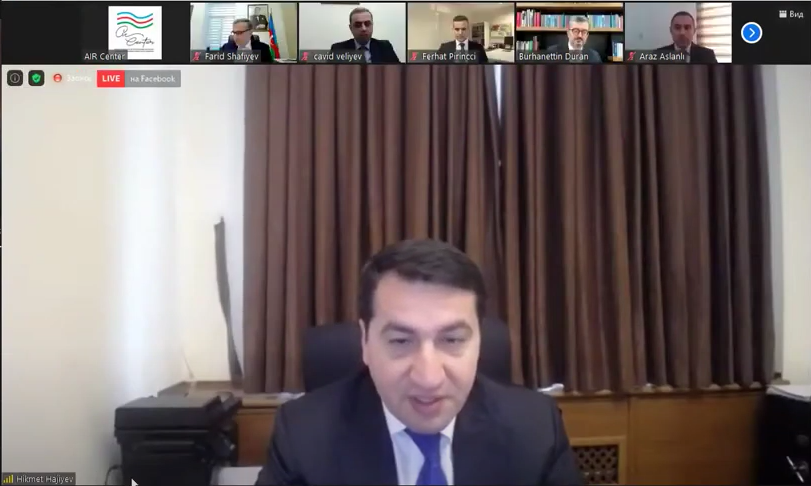A joint webinar titled "The next 10 years of Azerbaijani-Turkish relations" was held by the Center of Analysis of International Relations and the Foundation for Political, Economic and Social Research (SETA). The moderator of the event, AIR Center's Chairman Farid Shafiyev, said that as a victorious country, Azerbaijan has begun to restore the formerly occupied territories and implement relevant regional projects. Farid Shafiyev noted the exceptional role of Turkey in achieving this victory. He talked about how Turkey and Azerbaijan have been undergoing continuous military exercises for 30 years, and the victory was not achieved only by unmanned aerial vehicles: "Turkish-Azerbaijani unity is not directed against any country, it serves to ensure our independence." He added that the two countries should also strengthen joint capacity in the field of science. He also stressed the importance of cooperation within the Islamic world.
In his opening speech, Hikmet Hajiyev, assistant to the President of the Republic of Azerbaijan and the head of the Foreign Policy Department of the Presidential Administration of the Republic of Azerbaijan, noted that Turkish-Azerbaijani relations go beyond ordinary relations into stable fraternal relations. He expressed confidence that these relations will continue in the same way for hundreds of years to come. Recalling the military parade held in Azerbaijan in 2018 on the occasion of the liberation of Baku from occupation in 1918, Hajiyev said that this event embodied the unity of the two countries. According to him, the support of brotherly Turkey to the Armenian provocations in July 2020 also influenced the policy pursued in the region: "During the July events, the unhesitating statement of fraternal Turkish officials, led by President Recep Tayyip Erdogan, that 'we stand by Azerbaijan' was a statement of great geopolitical change in the region." Mr. Hajiyev said that the moral, diplomatic, psychological and political support of Turkey during the 44-day war was very important and one of the elements determining the victory of Azerbaijan: "We must further develop relations in the coming periods and processes. This cooperation strengthens regional peace and security. This cooperation is not against anyone. Our tripartite cooperation [with Georgia] shows that everyone can benefit from this cooperation. Armenia can also benefit from the cooperation between Azerbaijan and Turkey."
Hikmet Hajiyev also touched upon the importance of joint energy and transport projects implemented by Turkey and Azerbaijan for the region.
Speaking next, the general director of SETA, Burhanettin Duran, said that his organization was working on the preparation of a book on Karabakh. He spoke about the strength of historical and cultural ties between the two countries, noting that these relations have entered a new phase with the victory of Azerbaijan. According to him, despite the campaign against Turkey, Turkey continuously showed its support for Azerbaijan during the war. Speaking later, SETA Foreign Policy Director, Professor of Ankara University of Social Sciences Muhittin Ataman noted that Turkey has always stood by Azerbaijan not only during the war but also before and in the post-conflict period. He stressed the importance of this support needing to be expressed by all Muslim countries. Araz Aslanli, chairman of the Caucasus Center for International Relations and Strategic Studies, spoke about regional projects implemented by the two countries and said that Trans-Caspian cooperation has the potential to further strengthen Azerbaijani-Turkish cooperation. Farhad Pirincchi, a lecturer at Uludag University and a representative of the SETA Security Coordinator, said that the future of Turkish-Azerbaijani relations should not be limited to the Caucasus or Karabakh. According to him, the relations should cover a wide area, taking into account all geopolitical realities.
The next speaker, Javid Valiyev, head of department at the AIR Center, spoke about the importance of regional tripartite platforms. According to him, the projects implemented with the participation of the two countries are projects that benefit all parties, and this philosophy can continue in the form of cooperation between the six countries. Ogtay Tanrisever, a lecturer at the Middle East Technical University (METU), touched upon the return of the IDPs to the liberated territories of Azerbaijan and said that Turkey's experience in the construction sector could be used to help to rebuild the region. He also said that agile work must be done to show that the regional cooperation platform of the six countries is real.
The event continued with a question and answer session.




